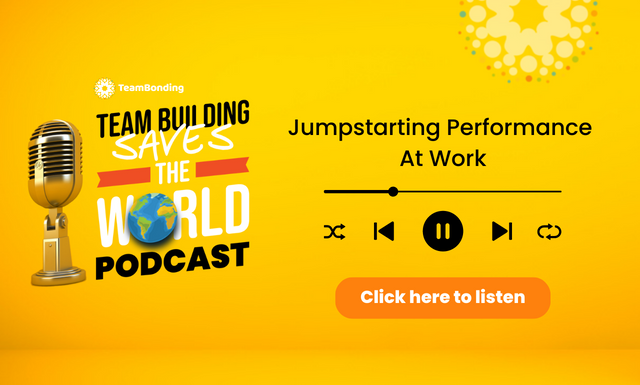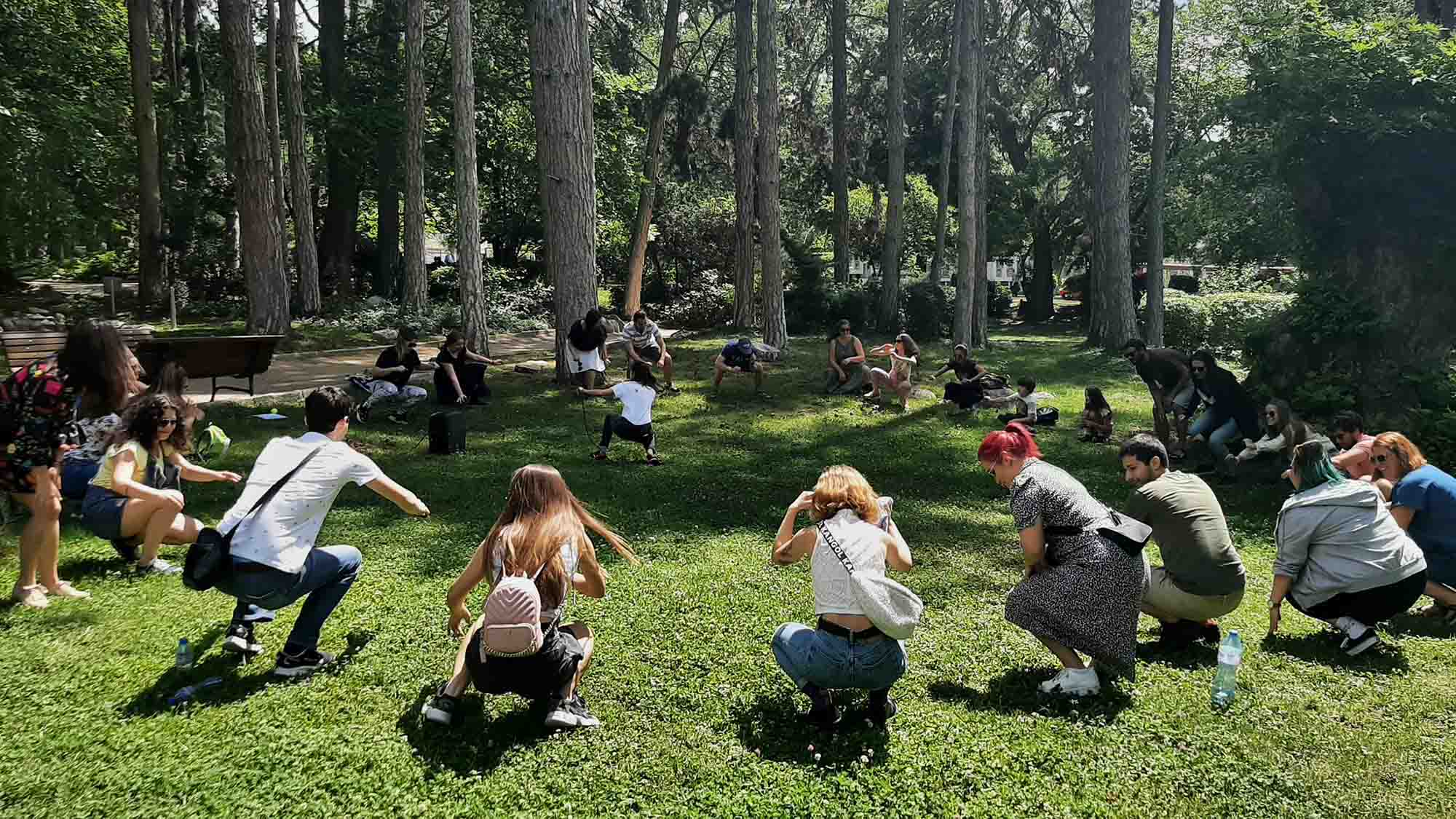If you’re a manager or leader, you are likely always looking for ways to improve work performance. You want your employees to be doing their best work with the most efficiency possible. And as a leader, you play a big role in increasing work performance.
In our most recent episode of the Team Building Saves The World podcast, we talked with COO of the Third Eye, Anais Rodriguez. During the discussion, she defined work performance and mentioned that it’s deeper than just output.
“I think that most would define employee performance as productivity and task oriented. We have another layer where we like to think of it as how do employees add to the overall culture of the agency,” she stated.
In this blog, we’re going to look at how to improve your work performance—including the role leadership plays and five strategies for improving performance at work.
The Role of Leadership
First, it’s important to note the role that leadership plays in performance. Many bosses and managers put all of the responsibility on improving performance on the employees, but that’s not really how things work.
Leaders are supposed to lead. They show employees how they should be acting and doing things at work. Leaders shape the work environment to make it a place where employees can do their best. There’s a lot of responsibility that leaders have in terms of improving work performance.
People follow their leaders, so bosses and managers need to lead by example. Implement the strategies detailed below for yourself, and you’ll find that your employees will follow. If you set the right example, you’ll have no problem improving work performance.
5 Strategies for Improving Performance
Now, let’s take a look at strategies to help improve performance. We were going to go with 3 ways to improve work performance, but we went with 5 instead to give you even more ways to better performance.
1. Set Clear Goals
One of the best ways to improve performance is by setting clear goals. Many people overlook the importance of goals, but they play a huge role when it comes to work performance. Having goals can help keep people motivated, connected, and united.
Not having goals can cause issues with productivity. Employees don’t know what they’re working towards, aren’t united around a goal, and they don’t understand how they fit into the bigger picture. Having good, clear, actionable goals alleviates those issues and can increase work performance.
Just make sure you are setting realistic and achievable goals. If your goals are unrealistic, it could have the opposite effect you’re looking for. Try using the SMART goals method to ensure you are setting good goals.
Also, you need to make sure you communicate your goals clearly. If no one knows what the goals are, they can’t work towards them. Make sure that everyone is on the same page with your goals and is aware of the role they play in achieving them. If everyone is aware of the goals and what they need to do, you should see a noticeable difference in work performance.
2. Improve Communication
Communication is another important part of work performance. Effective communication is the backbone of any successful team, so you want to make sure you create a workplace environment where people are comfortable communicating freely.
For example, Rodriguez talked about work-life balance during our conversation and how communication plays a key role. She emphasized that communication is necessary to properly set boundaries and create a good balance.
“To me, work-life balance is sort of a partnership between the employee and the organization. I see a lot of organizations out there saying, ‘we’re all about work-life balance. This is all that we do,’” she said. “But I think that the employee also has to come to the table and make sure that they are setting boundaries for themselves.”
Take the time to put an emphasis on communication. Make sure employees feel safe and comfortable speaking freely. Consider their input and give constructive feedback. Ensure everyone has time to speak during meetings. A little bit of focus on communication can have a huge impact.
3. Embrace Diversity and Collaboration
When looking for ways how to improve work performance, many overlook diversity and collaboration. Diversity is a strength, and when coupled with collaboration can allow your team to rise to greater heights than ever before.
A real-world example of this are introverts and extroverts. Extroverts tend to get more focus in the workplace due to their social nature, but introverts have a lot to offer as well. Taking the time to support introverts in the workplace can help make your teams more diverse and result in better performance.
Outside of that though, there are all sorts of different people in your workplace. They each have something special to offer, so take advantage of that. Lean into your team’s diversity and use it as a strength.
And when you couple that with collaboration, you can increase performance even more. Collaboration allows a diverse team to pool their strengths and shore up weaknesses any individual team member may have. This can result in a stronger, more efficient, and more productive team than one that is reluctant to collaborate.
4. Prioritize Employee Wellbeing
It may not be the first thing that comes to mind when you ask “how can you improve your performance at work,” but it’s more important than many give it credit for. Employees that are feeling good, happy, and energized are going to have better performance than those who are tired, burnt out, and frustrated with work.
Think about it from a personal perspective. When are you most productive at home? Is it after a long and stressful day of work? Probably not. It’s most likely when you’re in a good mood, not stressed, and feel energized/refreshed. The same applies to work.
However, making sure that employees are doing well can be more difficult than it seems. There are a lot of different things to consider when looking at employee wellbeing. How satisfied are they with their work? Are they fulfilled? Do they have a good work-life balance? Do they feel supported? Do they understand their importance in the workplace? Those are just a few of the factors you need to be considering when prioritizing employee wellbeing.
Since COVID, hybrid work has become a common option for many businesses. While hybrid work has its drawbacks, it also has benefits. One of those benefits is for employee wellbeing. The flexibility and freedom that comes with hybrid work can help people reduce stress and get a better work life balance.
Rodriguez noted this during our interview, saying, “I would say overall we’ve seen a very positive impact from the hybrid work. People are less stressed, right? About things like picking up their kids because they know they have the flexibility.”
On top of that, you can also consider wellbeing initiatives. These initiatives can include things like mental health resources, professional development opportunities, recognition programs, work-life balance initiatives, and more. These initiatives can all result in increased productivity, wellbeing, engagement, retention, and productivity.
5. Employee Development and Team Building
Last but not least, employee development and team building are also great for improving work performance. This one might seem a bit too obvious, but many people end up overlooking the importance of professional development and relationship building. There’s two main reasons these have a big impact on performance.
To start, people don’t want to feel stuck or stagnant. That can quickly lead to burn out, frustration, and job jumping. Supporting your employees and helping them grow can give them a confidence boost and keep them motivated at work. It also benefits you in that your employees are getting better and better via the development.
The other reason is that collaboration is highly important as mentioned above, and team building can help better collaboration. Teams that are disconnected and don’t have good relationships do not work as cohesively as those that do. The best teams will always be those that can work together closely and confidently. And team building is a great way to build those connections between team members.
At Team Bonding, we have numerous programs that are great for improving work performance. Corporate CSI for example is perfect for improving communication and strengthening bonds between team members. Team Wellbeing is a fun and exciting event that focuses on wellbeing, helping your teams become closer and more cohesive. Star Games is a Jedi themed event where your team members have to use teamwork and strategy to complete activities, helping your team improve collaboration while having fun.
Though team building can seem too fun to be “work,” it can be more impactful than you think. Don’t underestimate the impact that team building can have on your team in terms of ways to improve work performance.
Improve Your Work Performance with Team Bonding
Work performance is something that everyone wants to improve, but it can be more difficult than it seems. However, through goal setting, communication, diversity, collaboration, employee wellbeing, and employee development, you can improve your team’s work performance.
Start improving your performance today with Team Bonding. We have many events that are perfect for improving skills like communication, goal setting, collaboration, wellbeing, and more. So get in touch with us today and start improving your team.

















